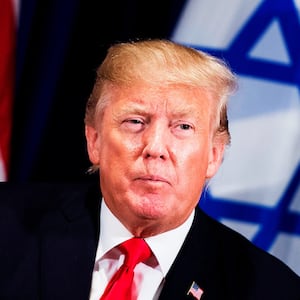With 89 days to go until the 2020 presidential election, President Donald Trump on Thursday unveiled a deal between Israel and the United Arab Emirates that marks a significant step in establishing peace in the Middle East—a promise Trump made in his first 100 days in office.
Speaking with reporters Thursday, Trump joked that he wanted the pact, an agreement to normalize diplomatic relations, “to be called the Donald J. Trump accord.” National Security Adviser Robert O’Brien said it “wouldn’t surprise him” if Trump was nominated for a Nobel Peace Prize because of his role in helping broker the deal.
But for all the intentional focus by the White House on the president Thursday, senior administration officials say it was Trump’s son-in-law Jared Kushner who worked behind the scenes over the last several months to smooth out the agreement and convince Prime Minister Benjamin Netanyahu and Crown Prince Mohammed Bin Zayed (MBZ) to agree to it publicly in the lead up to the 2020 election. Thursday’s announcement is an extension of a years-long effort by Kushner to construct a working Middle East Peace Plan, an accord formally announced by President Trump in January, and officials say they expect the president’s son-in-law to deliver similar agreements between Israel and other Arab nations in the next several weeks.
Trump’s announcement Thursday highlights the critical role Kushner could play in delivering foreign policy wins for the president in the weeks leading up to the 2020 election. It also underscores the extent to which Kushner has cultivated his personal relationships with world leaders, including Netanyahu, to advance the Trump administration’s interests. While some national security officials have previously chided Kushner for operating outside of the traditional interagency process, some senior officials now acknowledge the importance of the president’s son-in-law continuing to use his connections to broker these deals and bolster Trump’s chances at winning in November.
“There’s no way this would have gotten done without Jared,” one senior official said.
As Trump’s foreign policy and national security teams work to bolster the president’s foreign policy credentials in the lead up to the election, senior administration officials, including those in the national security apparatus, say the White House is increasingly focused on introducing additional agreements between Israel and other Arab nations. One official said Kushner and other senior officials were in talks with Bahrain about a similar pact.
Other national security officials who spoke to The Daily Beast said that while they view the Israel-UAE agreement as a step forward in establishing peace in the region, they are concerned about the leeway it gives Netanyahu to backpedal on one of the deal’s major points.
Israel and the UAE have, among other things, signed on to establishing embassies, increasing trade, and partnering on the fight against the coronavirus. Under the agreement, Israel has also promised to temporarily suspend annexation of the West Bank. On that particular point, though, Netanyahu and MBZ on Thursday offered different statements. MBZ said on Twitter that an “agreement was reached to stop further Israeli annexation of Palestinian territories.” But Netanyahu said during a speech Thursday evening Jerusalem time that he was still “committed to annexing parts of the West Bank to Israel.” Netanyahu was criticized Thursday for seemingly flipping on an issue he’d promised to carry out during his recent campaign.
Those officials also said they were wary of any Israel-UAE agreement that dealt with annexation without the input of the Palestinians.
“This could just be an agreement for an agreement’s sake,” said one senior administration official. “We have to see what actually comes out of this and if both sides follow through. I’m not going say this isn’t a big deal. It is. But I’m not confident that this pact gets rolling anytime soon.”
Since June, Kushner has worked closely with U.S. Ambassador to Israel David Friedman to iron out the details of the Israel-UAE deal, said two senior administration officials, particularly on the language around annexation. In Washington, Kushner also worked with the Near Eastern Affairs Desk at the State Department and with Brian Hook, the special adviser on Iran, officials said. Hook traveled to Israel in July and spoke with Netanyahu about the accord, one other senior official said.
While O’Brien oversaw the U.S. outreach to the Israelis and Emiratis, the bulk of the negotiations took place between Kushner, UAE Ambassador to the U.S. Yousef Otaiba and Israel’s Ambassador to the U.S. Ron Dermer, officials said. Kushner is close with both ambassadors and has for years consulted with them in the drafting of his Middle East Peace Plan.
Senior officials pointed to Otaiba’s presence at the Middle East Peace Plan unveiling in Washington in January, where Trump announced the deal alongside Netanyahu, as the first public sign that the UAE was willing to work with Jerusalem. Since then, officials said, the administration has attempted to draw in the UAE on the idea of normalizing relations with Israel—a difficult task given the peace plan’s focus on the lasting security of Israel and the Palestinians rejecting it from the beginning.
Otaiba recently published an op-ed in a prominent Israeli newspaper in which he outlined the ways in which Israel and the UAE could cooperate on technology, climate change, and science. “Annex will be an unmistakable sign indicating whether Israel views matters the same way,” he said.
With the announcement Thursday, Otaiba seemed to indicate that the UAE would continue to pressure Israel to adhere to its plans to suspend annexation.
“The UAE will continue to remain a strong supporter of the Palestinian people–for their dignity, their rights and their own sovereign state,” Otaiba said in a statement Thursday. “They must benefit too in normalization. As we have for fifty years, we will forcefully advocate for these ends.”






